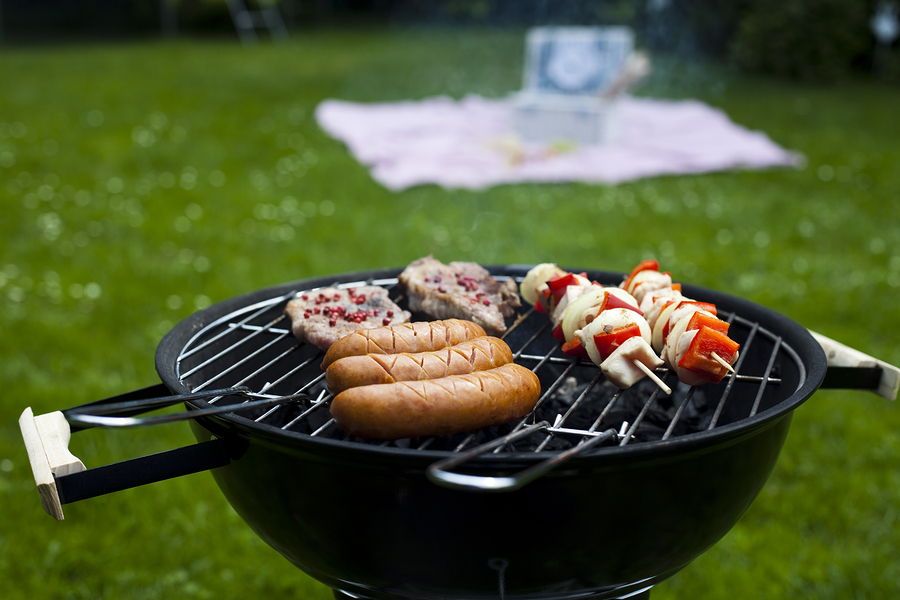
Whether you’re the host or the guest, with a little planning, you can enjoy all the bountiful foods of summer without the guilt.There’s something so manly about grilling. Maybe it’s because my (admittedly sexist) view of cooking has the woman in the kitchen while the outdoor grill is the man’s domain. That’s how it is in our house, even if the husband still prefers that I actually light the grill, lest it explode and wipe him out. But I aim to please, and I have no problem lighting the grill if that means someone else is doing the cooking. For me, nothing invokes the pleasures of summer more than wafts of deliciousness coming from food sizzling on the grill while sipping a cold, adult beverage nearby. But if just the thought of a summer barbecue has you reaching for your antacid, fear not. Whether you’re the host or the guest, with a little planning, you can enjoy all the bountiful foods of summer without the guilt.
As with any healthful eating strategy, it’s important to plan ahead and make convenience work in your favor. Think about portions, choosing a nice balance of protein, good carbs (veggies and fruits), and limiting your alcohol consumption. As with so many situations in life, when it comes to maintaining a healthy weight, it’s easier to keep up than catch up. Here are six tips for how to dig in at the barbecue and keep your waistline from budging.
1. Choose Your Protein Wisely
Big, thick steaks have a certain appeal, but smaller, leaner meats don’t make you feel gross after you eat them. Rib-eye, porterhouse, and T-bone steaks pack the most calories, so opt instead for lower-cal top sirloin or top round cuts. Chicken, pork, and fish are also excellent grilling choices. Be sure to remove the skin from chicken before cooking and trim any visible fat from all proteins. Fat-free ground turkey is the lowest calorie option for burgers, and pork tenderloin and top loin chop are your best bets with pork. There’s something adorable about shrimp on the grill, and wrapping salmon or any fresh fish filet in foil and popping it on the grill allows for a quick, flavorful steam.
2. Make the Most of Marinade
Marinate all proteins for at least 30 minutes but aim for one hour for seafood, two hours for chicken, and four hours for pork, lamb, and beef.Marinades help seal in flavor and keep the protein from drying out. A basic marinade mixes equal parts oil and some form of acid (vinegar, lemon juice) with garlic, salt and pepper. Take the basic marinade in any direction by adding other spices and herbs. Think about the flavor combos you enjoy: Mexican, Asian, Mediterranean, Greek, Cajun. Marinate all proteins for at least 30 minutes but aim for one hour for seafood, two hours for chicken, and four hours for pork, lamb, and beef. The acid in the marinade will start breaking down the proteins immediately so set a timer and get the meat on the grill once it’s done soaking up all that flavor.
3. Turn Down the Heat
Several studies suggest that meats cooked at high temps create chemicals, heterocyclic amines (HCAs), that could increase your risk of cancer. The National Cancer Institute warns that HCAs and polycyclic aromatic hydrocarbons (PAHs) should be avoided. PAHs occur when beef, pork, fish, or poultry are cooked over an open flame. Both HCAs and PAHs have the potential to “cause changes in DNA that may increase the risk of cancer,” according to the NCI. Slow and low is the way to grill – aim to keep the heat between 300-325. None of the meat should be blackened and remove any charred bits before serving them to your guests. And don’t forget that marinade. The results of a 2008 study published in the Journal of Food Science found that using a marinade, specifically one with red pepper and mint, can cause a decrease in HCA formation.


